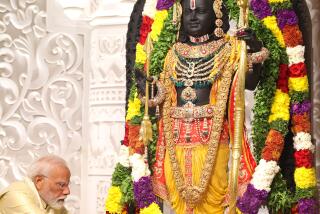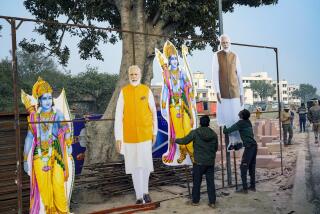PERSPECTIVES ON INDIA : At Ayodhya, a Tryst With Tragedy : The razing of the mosque can be blamed on venal politicians who corrupt Nehru’s pledge of equitable development.
- Share via
As an Indian-born Hindu, I am ashamed of the zealots who claim to be the standard-bearers of my ancient religion. Their destruction this past weekend of a 16th-Century mosque in the northern Indian town of Ayodhya--said to be the birthplace of Lord Rama, a hero of Indian mythology--was neither in the traditions of Hinduism nor in its best interests.
These zealots say they acted in the name of Hindu revivalism. But the only revivalism practiced by these old-fashioned thugs was imposing the tyranny of the majority on a terrified minority of Muslims. I fear that the destruction of the Ayodhya mosque will hasten the desecularization of the Indian state and invite political ostracizing of India in the global Islamic community. And this sad episode is bound to spawn new ethnic violence in a subcontinent that has long suffered from mindless hostilities between Hindus and Muslims.
This Hindu believes that the cynical politicians who led the march against the Ayodhya mosque did an enormous disservice to their country at a time when India is sorely in need of ethnic amity and reconciliation. While India’s faltering economy needs domestic tranquillity in order to grow and also attract foreign investment, our venal politicians have further divided India along caste, class and regional lines.
The Indian polity was already in a highly fragile condition before last weekend’s terrible episode of hate and bigotry. Militant separatists in the strategic state of Punjab continue to fight for a theocratic nation that they want to call Khalistan, the “land of the pure” (which means no Hindus and Muslims, only indigenous Sikhs). In the northern state of Kashmir, the struggle between Indian troops and Muslim irredentists has very nearly brought the once- vibrant local economy to a standstill.
Indian politicians have increasingly exploited and manipulated all the societal and structural weaknesses inherent in a developing society that is still not quite rid of the psychological baggage of colonialism. Mouthing populist slogans and discredited socialist shibboleths, these politicians appeal to the baser instincts of an electorate in a nation where more than 400 million people--or half of the total population--live in abject poverty. The venality of India’s politicians is breeding the kind of unrest that requires repression. That means more dependency on military and paramilitary forces. The long-term implications of this are frightening for the world’s biggest democracy.
Of course, a growing number of India’s 100-million-strong Muslims have been emboldened by the rise of fundamentalism in the Middle East. They do not share the secularist view of political development in which modernization goes hand-in-hand with a liberal ethos. They are distressed by what they perceive to be encroaching Westernization in Indian society.
There can be little doubt that the rise of Hindu right-wing militancy is at least partly an expression of dissatisfaction with the slow pace and uneven patterns of economic development in India. A lot of poor Hindus feel--rightly or wrongly--that secularist policies have made them poorer than poor Muslims and other favored minorities. Weak leadership at the federal level, combined with mounting assertiveness by regional leaders catering to parochial interests, has contributed to the acceleration of national problems.
One way to resuscitate the once-buoyant hopes for economic, social and political development in India would be the instituting of a presidential form of government that would be less of a hostage to parochial disputes and transient legislative alliances than the current Westminster parliamentary model. A strong federal leader is needed to make the center hold in a multiethnic, polyglot country such as India.
There is also a pressing need for a resurgence of that spirit of selfless enthusiasm for public service and moral purpose that characterized the stirring days of India’s struggle for independence from the British. This would require a new national movement in which the media, grass-roots civic groups, perhaps even the judiciary, can play a renewed role in the selection of national and local leaders and in strengthening a national policy of secularism.
The true victims of today’s deteriorating situation are everyday Indians--Hindus and Muslims alike--who deserve better, and who continue to hope for a redemption of the pledge of equitable development that was promised by Jawaharlal Nehru at Independence nearly two generations ago. But for now, at least, the “tryst with destiny” that Nehru promised has turned into a tryst with tragedy produced by his self-serving political descendants.
More to Read
Sign up for Essential California
The most important California stories and recommendations in your inbox every morning.
You may occasionally receive promotional content from the Los Angeles Times.










